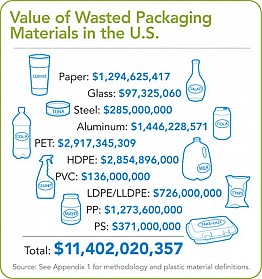September 2, 2014
Today’s Guest Blogger is Robert Kropp, a Vermont-based freelance journalist and NERC’s bookkeeper. The article was first posted in Social Funds on August 20, 2014.
A consortium of major corporations led by Walmart launches the Closed Loop Fund to help fund municipal recycling projects, but critics say EPR will accomplish more.
SocialFunds.com -- A 2012 report by As You Sow included an illustration that reveals the shortcomings in recycling efforts in the US. According to the illustration, the value of wasted packaging in the US in 2010 alone was almost $11.5 billion. “US packaging recycling rates lag behind other developed countries by significant amounts,” the report states.
Led by Walmart, a consortium of major corporations that also includes Coca-Cola, PepsiCo, Johnson & Johnson, Procter & Gamble, Unilever, Keurig Green Mountain and Goldman Sachs, recently announced an initiative with the aim of boosting municipal recycling rates. The Closed Loop Fund is described by its investors as “a social impact fund that provides municipalities access to the capital required to build comprehensive recycling programs.” The Fund plans initial investments amounting to $100 million that will be distributed to municipalities in the form of zero-interest and low-interest loans.
"We don't want to be the sole source of capital for a city," Closed Loop Fund CEO Ron Gonen told Resource Recycling. "Solving the recycling issue requires a lot of pieces coming together.”
There is a measure of irony in the Fund brochure's use of an illustration previously published in the As You Sow report. Through its Waste Program the organization has always been emphatic in its advocacy for extended producer responsibility (EPR); widespread adoption of EPR policies “challenge companies to take responsibility for the impact of products and packaging over their full lifecycle,” it states. Instead of taxpayers shouldering the externalized financial and environmental impacts of unnecessarily high percentages of plastic waste, under EPR companies would take the responsibility of recycling.
The markedly superior recycling rates in Europe certainly have as a component legislation mandating EPR there. In the US, on the other hand, only a small number of bottlers—Coca Cola and PepsiCo, two of the Closed Loop Fund consortium, among them—have agreed to accept responsibility for some of their post-consumer plastics. Resolutions filed by As You Sow with a number of consumer products companies have met with significant support at some companies' annual general meetings—over one-fourth of Kraft Foods shareowners voted for a first-time resolution on the issue—but generally consumer products companies have been resistant to taking responsibility for internalizing product lifecycle costs through EPR.
As You Sow points out in its argument for EPR, “there is scant funding for new municipal or state recycling operations.” That being the case, the Closed Loop Fund does have the potential for being somewhat helpful. But $100 million in investments from some of the world's wealthiest corporations is unlikely to make serious inroads on the recycling crisis facing the US. And even if the $100 million was provided as grants instead of loans, it would hardly meet the responsibility of companies operating in accordance with EPR legislation.
After the launch of the Closed Loop Fund was announced, a number of public interest organizations wrote to the CEO of Walmart. “While we acknowledge and appreciate your aspirational goal 'to provide 100 percent of U.S. consumers with access to recycling where and when they need it,' we don’t believe the proposed fund will do much to achieve it,” the signatories wrote.
“Instead, we urge you to support extended producer responsibility (EPR) legislation, which would make your consumer goods companies responsible for financing packaging recycling and meeting recycling targets,” the letter continued.
Noting that many of the Closed Loop Fund investors operate under EPR legislation in Europe while resisting similar legislation in the US, Matt Prindiville, Associate Director for UPSTREAM, said, “This is perhaps the unspoken agreement behind this raw deal – that companies bear little to no responsibility for their packaging; and that governments should continue to subsidize the management of packaging waste through municipal waste services and taxpayer dollars.”
Robert Kropp writes regularly for Social Funds, a personal finance site dedicated to socially responsible investment.
NERC welcomes Guest Blog submissions. To inquire about submitting an article contact Athena Lee Bradley, Projects Manager. Disclaimer: Guest blog’s represent the opinion of the writer and may not reflect the policy or position of the Northeast Recycling Council, Inc.



Comments (0)
Add a Comment